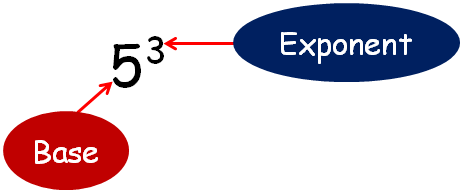EXPONENTS WITH INTEGER BASES
Subscribe to our ▶️ YouTube channel 🔴 for the latest videos, updates, and tips.
An integer is a number that can be written without a fractional component.
Before going to see example problems in this topic, first we have to see what is exponent and what is base.

We have the following stuff on exponents of integer bases.
- Positive base with positive exponent
- Positive base with negative exponent
- Negative base with positive exponent
- Negative base with negative exponent
|
Positive base with positive exponent 52 Negative base with positive exponent (-5)2 |
Positive base with negative exponent 5-2 Negative base with negative exponent (-5)-2 |
Positive Base with Positive Exponent
The exponents of a number says, how many times the base has to be multiplied by itself.
Example 1 :
Evaluate :
107
Solution :
Base = 10
Exponent = 7
Then,
107 = 10 x 10 x 10 x 10 x 10 x 10 x 10
107 = 10000000
Example 2 :
Evaluate :
82
Solution :
Base = 8
Exponent = 2
Then,
82 = 8 x 8
82 = 64
Positive Base with Negative Exponent
When we have negative exponent for the positive base, first we have to make the exponent as positive. For that, we have to write the reciprocal of the base and change the negative exponent as positive.
Example 3 :
Evaluate :
3-2
Solution :
Base = 3
Exponent = -2
Then,
3-2 = (1/3)2
3-2 = (1/3) x (1/3)
3-2 = 1 / 9
Example 4 :
Evaluate :
4-3
Solution :
Base = 4
Exponent = -3
Then,
4-3 = (1/4)3
4-3 = (1/4) x (1/4) x (1/4) x (1/4)
4-3 = 1 / 256
Negative Base with Positive Exponent
When we have positive exponent for the negative base, instead of repeating the negative sign, we can follow a simple method to decide whether the answer will be a positive value or negative value.
- If the exponent is an even number, then the answer will be a positive value.
- If the exponent is an odd number, then the answer will be a negative value.
Example 5 :
Evaluate :
(-7)4
Solution :
Base = -7
Exponent = 4
Here, the exponent is 4 which is an even number. So, the answer will be a positive value.
(-7)4 = 7 x 7 x 7 x 7
(-7)4 = 2401
Example 6 :
Evaluate :
(-2)5
Solution :
Base = -2
Exponent = 5
Here, the exponent is 5 which is an odd number. So, the answer will be a negative value.
(-2)5 = - 2 x 2 x 2 x 2 x 2
(-2)5 = - 32
Negative Base with Negative Exponent
Example 7 :
Evaluate :
(-3)-4
Solution :
(-3)-4 = (-1/3)4
Here, the exponent is 4 which is an even number. So, the answer will be a positive value.
(-3)-4 = (1/3) x (1/3) x (1/3) x (1/3)
(-3)-4 = 1 / 81
Example 8 :
Evaluate :
(-6)-3
Solution :
(-6)-3 = (-1/6)3
Here, the exponent is 3 which is an odd number. So, the answer will be a negative value.
(-6)5 = - (1/6) x (1/6) x (1/6)
(-6)5 = - 1/216
Subscribe to our ▶️ YouTube channel 🔴 for the latest videos, updates, and tips.
Kindly mail your feedback to v4formath@gmail.com
We always appreciate your feedback.
About Us | Contact Us | Privacy Policy
©All rights reserved. onlinemath4all.com

Recent Articles
-
SAT Math Problems on Exponents and Radicals
Feb 21, 26 08:28 PM
SAT Math Problems on Exponents and Radicals -
SAT Math Problems on Angles
Feb 21, 26 08:20 PM
SAT Math Problems on Angles -
Digital SAT Math Problems and Solutions (Part - 9)
Feb 21, 26 10:41 AM
Digital SAT Math Problems and Solutions (Part - 9)

